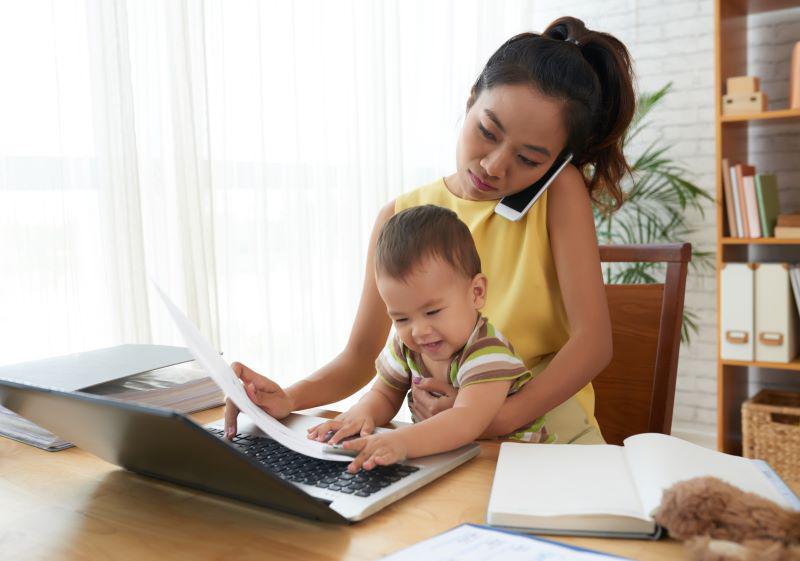Get Healthy!

- Posted February 9, 2022
Lockdowns May Not Have Harmed Toddlers' Language Learning: Studies
The pandemic has dramatically disrupted kids' normal routines, but a new study suggests the initial lockdowns of 2020 did not necessarily hinder preschoolers' language development.
In fact, researchers found, there was an unanticipated "lockdown boost" in youngsters' vocabulary growth -- possibly because parents were spending more time at home.
Studying families in 13 countries, the researchers found that, on average, babies and toddlers made greater gains in vocabulary during that early lockdown period, versus the pre-pandemic norm for youngsters their age.
"Our study did not find any evidence of negative influences of social isolation on vocabulary development in 8- to 36-month-old toddlers during the initial lockdown," said researcher Julien Mayor, a professor of developmental psychology at the University of Oslo in Norway.
There's a big caveat, though, according to Mayor and colleague Natalia Kartushina, also of the University of Oslo.
The investigators found no harm among families who were willing to participate in the study -- but that group may not represent families at large, especially those who are less advantaged.
"We urge caution in generalizing this finding to all families, as it is likely that the most vulnerable families did not respond to the questionnaires," Mayor said.
Diane Paul, a speech-language expert who was not involved in the study, agreed on that caution.
But she also said the research may reassure many parents.
"Overall, these are positive, very encouraging findings," said Paul, who is director of clinical issues in speech-language pathology for the American Speech-Language-Hearing Association.
The results also support what's already recommended to parents for fueling young children's language development: spend time reading together, and limit "passive" screen time.
During lockdown, the researchers found, vocabulary growth was greatest among toddlers who had plenty of shared reading time with their parents, and less time gazing passively at tablets and TVs.
"These are suggestions we'd give to all families of young children," Paul said.
Of course, she noted, the early phase of the pandemic thrust families into a difficult time of school and day care closures. Even when parents could work from home, juggling that along with child care was a huge task.
So parents should not feel guilty if they did have to turn to devices more often during that period, Paul added.
In fact, in a second study, the same research team found that babies' and toddlers' total screen time did tick upward during lockdown -- especially when parents spent a lot of time in front of screens themselves.
Despite that, there was no evidence youngsters' language development suffered. That's possibly because of the time spent on other activities with their parents, according to the researchers.
And screen time is not necessarily negative, Paul pointed out. When young children watch "high-quality" content along with an adult -- talking and interacting -- that is different from passively sitting in front of cartoons.
"We're not saying never use screens," she said. "There are just ways to use them better."
The study, published in the journal Language Development Research, included more than 1,700 babies and toddlers aged 8 months to 3 years. The United States was among the 13 countries represented.
Parents completed standard vocabulary checklists on the number of words their child understood or said, at the beginning and end of the first lockdown in their respective countries. They also answered questionnaires on how often they and their child engaged in various activities during lockdown -- including reading together, outdoor play and structured games.
Overall, children in the study gained more words than expected, based on population norms for youngsters their age. And the more time spent reading with their parents, the greater those gains.
"This highlights the considerable impact of shared book reading in building a child's vocabulary," Mayor said.
Shared reading, Paul said, is more than simply reading a story to a child. It means pointing at pictures, asking questions and interacting in other ways that help youngsters learn to understand and use language.
"It's the time spent together," Paul said, "with contributions from the parent and the child."
More information
The American Speech-Language-Hearing Association has more on child language development.
SOURCES: Julien Mayor, PhD, professor, developmental psychology, University of Oslo, Norway; Natalia Kartushina, PhD, associate professor, department of linguistics and Scandinavian studies, University of Oslo, Norway; Diane Paul, PhD, CCC-SLP, senior director, clinical issues in speech-language pathology, American Speech-Language-Hearing Association, Rockville, Md.; Language Development Research, Feb. 7, 2022, online







